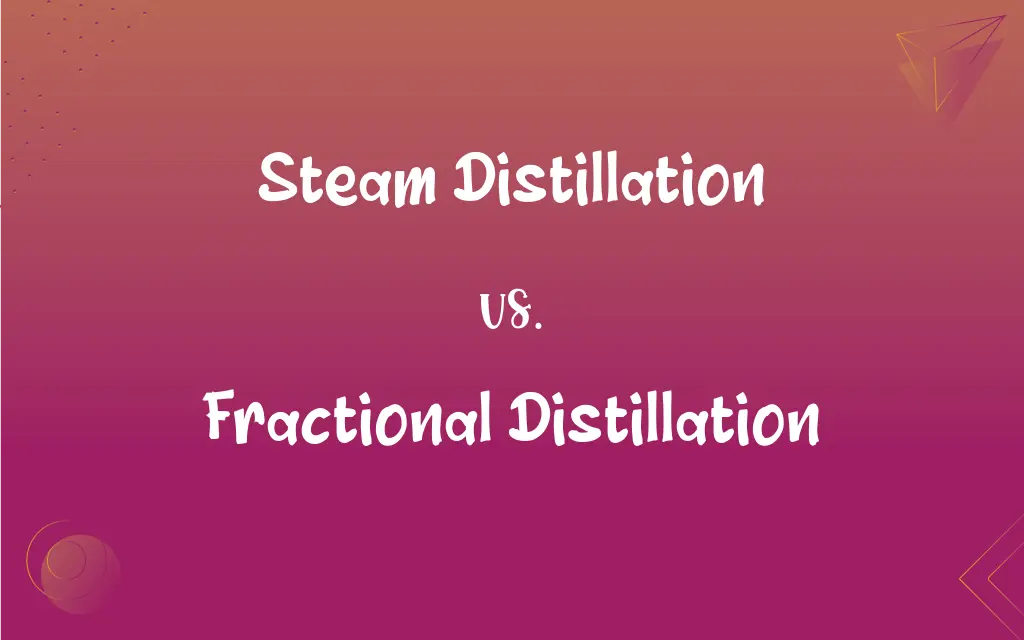Steam Distillation vs. Fractional Distillation: What's the Difference?
Edited by Janet White || By Harlon Moss || Published on January 11, 2024
Steam distillation separates heat-sensitive substances using steam, while fractional distillation separates mixtures based on boiling point differences.

Key Differences
Steam distillation is used to extract volatile compounds from heat-sensitive materials, typically in the essential oil and fragrance industries. Fractional distillation involves separating a mixture into its component parts or fractions, based on different boiling points, commonly used in petroleum refining and alcohol production.
In steam distillation, steam is passed through the plant material, vaporizing the volatile compounds which are then condensed and collected. In fractional distillation, the mixture is heated, and components with lower boiling points are vaporized and separated first.
Steam distillation is particularly effective for substances that are immiscible with water and have high vapor pressures. Fractional distillation requires a fractionating column for the separation process, which is absent in steam distillation.
The application of steam distillation is limited to substances that are stable at high temperatures. Fractional distillation is more versatile and can be used to purify complex mixtures like crude oil into its constituents like gasoline, diesel, etc.
Steam distillation is less efficient in terms of energy and material recovery compared to fractional distillation, which is more precise and can achieve higher purity of separated components.
ADVERTISEMENT
Comparison Chart
Purpose
Extract volatile compounds from heat-sensitive materials
Separate mixtures based on boiling point differences
Method
Uses steam to vaporize compounds
Uses a fractionating column to separate components
Application
Essential oils, fragrances
Petroleum refining, alcohol production
Suitability
Substances immiscible with water and stable at high temp
Complex mixtures with varying boiling points
Efficiency
Less efficient, limited recovery
More efficient, higher purity and recovery
ADVERTISEMENT
Steam Distillation and Fractional Distillation Definitions
Steam Distillation
Steam distillation is used for heat-sensitive, volatile compounds.
To preserve its properties, rose oil is extracted through steam distillation.
Fractional Distillation
Fractional distillation separates mixtures based on boiling point differences.
Crude oil is refined into various fuels using fractional distillation.
Steam Distillation
Steam distillation separates compounds immiscible with water.
Citrus oils are efficiently isolated by steam distillation.
Fractional Distillation
Fractional distillation is efficient for complex mixtures.
Fractional distillation is employed to purify liquid air into its components.
Steam Distillation
Steam distillation is a method to extract essential oils using steam.
Lavender oil is commonly extracted using steam distillation.
Fractional Distillation
Fractional distillation utilizes a fractionating column for separation.
The production of high-purity ethanol is achieved through fractional distillation.
Steam Distillation
Steam distillation operates at temperatures below the compound's boiling point.
Steam distillation allowed for the extraction of delicate floral scents.
Fractional Distillation
Fractional distillation is key in petroleum and chemical industries.
Gasoline and diesel are separated from crude oil using fractional distillation.
Steam Distillation
Steam distillation involves passing steam through plant material.
Steam distillation was employed to extract aromatic compounds from peppermint.
Fractional Distillation
Fractional distillation achieves high purity and recovery of components.
Fractional distillation is used to separate and purify different hydrocarbons.
FAQs
What is steam distillation?
A technique to extract essential oils using steam.
What is the main use of fractional distillation?
To purify complex mixtures like crude oil.
Does steam distillation require high temperatures?
It operates at temperatures lower than the boiling point of the compound.
When is steam distillation used?
For extracting volatile compounds from heat-sensitive materials.
What is fractional distillation?
A method to separate mixtures based on boiling point differences.
Can steam distillation extract any type of oil?
It's best for oils that are immiscible with water and stable at high temperatures.
What products are made using fractional distillation?
Products like gasoline, diesel, and kerosene.
How does fractional distillation work?
It uses a fractionating column to separate components based on boiling points.
Is steam distillation suitable for all plant materials?
It's ideal for plants that contain heat-sensitive aromatic compounds.
How efficient is fractional distillation?
It's highly efficient with high purity and recovery rates.
Are there any risks with fractional distillation?
It involves high temperatures and potentially volatile substances.
How does the steam in steam distillation work?
It vaporizes the volatile compounds in the material, which are then condensed.
Can steam distillation purify water?
Yes, it can also be used for water purification.
What industries use fractional distillation?
Primarily the petroleum and chemical industries.
Is specialized equipment needed for fractional distillation?
Yes, it requires a fractionating column and precise temperature control.
What is a fractionating column?
A device used in fractional distillation to separate different components.
Can fractional distillation separate alcohol from water?
Yes, it's commonly used to purify alcoholic beverages.
Is steam distillation expensive?
It can be less cost-effective due to lower efficiency.
What's the environmental impact of steam distillation?
It can be energy-intensive but is generally considered environmentally friendly.
Can steam distillation separate complex mixtures?
It's not as effective for complex mixtures as fractional distillation.
About Author
Written by
Harlon MossHarlon is a seasoned quality moderator and accomplished content writer for Difference Wiki. An alumnus of the prestigious University of California, he earned his degree in Computer Science. Leveraging his academic background, Harlon brings a meticulous and informed perspective to his work, ensuring content accuracy and excellence.
Edited by
Janet WhiteJanet White has been an esteemed writer and blogger for Difference Wiki. Holding a Master's degree in Science and Medical Journalism from the prestigious Boston University, she has consistently demonstrated her expertise and passion for her field. When she's not immersed in her work, Janet relishes her time exercising, delving into a good book, and cherishing moments with friends and family.
































































